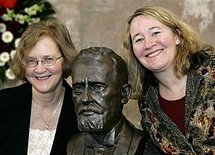
Their discovery has implications for the understanding of cancer and aging.
In a statement released by Baltimore, Maryland-based Johns Hopkins University, Greider said the award recognized that curiosity drives some of the most important scientific research.
"We had no idea when we started this work that telomerase would be involved in cancer, but were simply curious about how chromosomes stayed intact," said Greider.
"Our approach shows that while you can do research that tries to answer specific questions about a disease, you can also just follow your nose."
Greider shares the Nobel prize with Elizabeth Blackburn of the University of California, San Francisco, and Jack Szostak, of Harvard Medical School.
Blackburn, a molecular biologist, was hailed for her pathbreaking contributions to science by colleagues at the University of California, San Francisco.
"Her generous spirit, curiosity and highly collaborative nature have led her to forge research partnerships that have significantly broadened scientists' capacity to understand the remarkable telomerase enzyme," said UCSF chancellor Susan Desmond-Hellmann.
"As a scientist, a colleague, a mentor and a woman in science, she is an inspiration to the nation and the world," she said.
Stephen Desiderio, director of John's Hopkins Institute for Basic Biomedical Sciences, said the university was "thrilled" that Greider was being recognized for her work, "which reminds us that science is most powerful when it is driven by curiosity."
Greider, who works at Johns Hopkins School of Medicine, credits her father with her decision to go into science.
"He would say 'You can do whatever you want, but you have to like whatever you do,'" she said.
Szostak, a British-born Harvard genetics professor, called the award "the highest scientific honor, so it's great to receive that kind of recognition, again, it's great to share it with my collaborators, colleagues."
"It's a greater understanding of diseases of aging and of cancer and hopefully that will lead to practical benefits," Szostak said, adding: "I think that we need a balance between basic science and applied research."
--------------------------------------------------------------------------------------------------------------------------
In a statement released by Baltimore, Maryland-based Johns Hopkins University, Greider said the award recognized that curiosity drives some of the most important scientific research.
"We had no idea when we started this work that telomerase would be involved in cancer, but were simply curious about how chromosomes stayed intact," said Greider.
"Our approach shows that while you can do research that tries to answer specific questions about a disease, you can also just follow your nose."
Greider shares the Nobel prize with Elizabeth Blackburn of the University of California, San Francisco, and Jack Szostak, of Harvard Medical School.
Blackburn, a molecular biologist, was hailed for her pathbreaking contributions to science by colleagues at the University of California, San Francisco.
"Her generous spirit, curiosity and highly collaborative nature have led her to forge research partnerships that have significantly broadened scientists' capacity to understand the remarkable telomerase enzyme," said UCSF chancellor Susan Desmond-Hellmann.
"As a scientist, a colleague, a mentor and a woman in science, she is an inspiration to the nation and the world," she said.
Stephen Desiderio, director of John's Hopkins Institute for Basic Biomedical Sciences, said the university was "thrilled" that Greider was being recognized for her work, "which reminds us that science is most powerful when it is driven by curiosity."
Greider, who works at Johns Hopkins School of Medicine, credits her father with her decision to go into science.
"He would say 'You can do whatever you want, but you have to like whatever you do,'" she said.
Szostak, a British-born Harvard genetics professor, called the award "the highest scientific honor, so it's great to receive that kind of recognition, again, it's great to share it with my collaborators, colleagues."
"It's a greater understanding of diseases of aging and of cancer and hopefully that will lead to practical benefits," Szostak said, adding: "I think that we need a balance between basic science and applied research."
--------------------------------------------------------------------------------------------------------------------------









 Home
Home Politics
Politics









